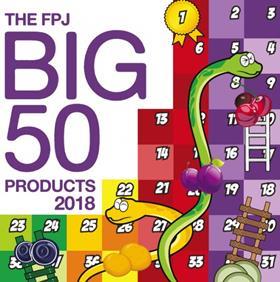
The FPJ Big 50 Products ranks the 50 best-selling fresh fruit and vegetable products by sales value, using Kantar Worldpanel data for the 52 w/e 20 May 2018.
01. Dessert Apples
Value: £915.2m (+4.9%) Volume: 434m kg (-4.3%)
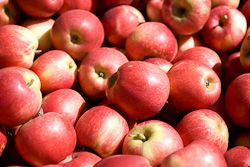
Number one again but weather stunts outlook
Dessert apples maintain pole position in the FPJ Big 50 Products, widening the gap between themselves and second-placed grapes. The topfruit enjoyed steady value sales growth in the 52 weeks to 20 May 2018, but this was thanks to a difficult season that growers could have done without.
“The rise in value and fall in volume is linked to the catastrophic crop we had last year, not just in the UK, but all over Europe,” explains Alan Griffiths of OrchardWorld. “There was erratic supply of Braeburn and we’ve never finished Cox as early as we did last year.”
As this year’s season approaches, growers are warning that there could be a lower than expected yield due to the cold weather at the end of March. AC Goatham & Son, which has been investing in its facilities, says the so-called ‘June drop’ has been much higher than usual due to the unseasonably low temperatures at the start of spring.
An upside to the recent sunny spell is a prediction by industry body English Apples & Pears (EAP) that we will get the tastiest English apples this century.
Moving forward, Griffiths sees opportunities for sales growth through the Great British Apples campaign, run by EAP. The organisation is hoping the Great British Apples logo will be adopted by more retailers this year, with Ocado and Booths already on board
02. Grapes
Value: £802.7m (+0.1%) Volume: 230.2m kg (-0.3%)
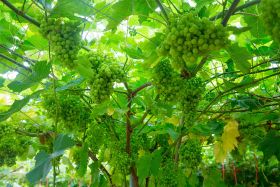
Modern snack continues to win new friends
Convenient, healthy and affordable, grapes are a product for the modern age, and new sweeter varieties are helping ensure they remain a snack for younger consumers as well as old.
Category performance is flat, but there have been changes to the varietal mix in recent years with Sable establishing itself and new varieties such as Cotton Candy, Muscat Beauty and Sweet Sapphire finding their feet. New Arra varieties are also among a raft of introductions set to come to market and offer consumers even greater choice.
Grapes continue to be ubiquitous in supermarket snack packs, both alone and in combination with apple slices, and that’s helping keep the category ticking over nicely. Smaller punnet sizes are also meeting the needs of the rising number of single-person households and help reduce waste, while more mixed-grape packs are adding variety to the offer.
Supply has, however, been an issue of late, with a number of key production regions suffering. Water shortages and drought have been highly problematic in South Africa, rain hit Indian production back in December and storms struck Italian production regions in May.
Fortunately suppliers continue to prove themselves adept at keeping quality product on shelf.
03. Tomatoes
Value: £769.7m(+4%) Volume: 272.4m kg (-0.8%)
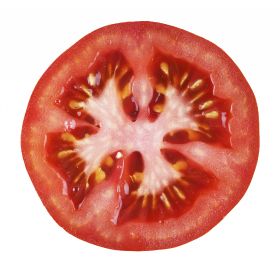
Premium end drives tomato sales
While some categories have benefited from selling out-of-spec produce as ‘wonky veg’, the overriding trend in tomatoes has been a move from all retailers into premium product. Phil Morley, technical officer at the British Tomato Growers’ Association, speculates that this was perhaps driven by Aldi and Lidl.
While this partly explains the rise in value sales since it has allowed retailers to push up unit prices, the main driver has been overall inflation, with Sainsbury’s, M&S and Waitrose all increasing their prices. Despite this, Morley notes that we are beginning to see deflation reappear and this is “probably being driven by competitive European imports”.
When it comes to the slight drop in volume sales, Alex Margerison-Smith of Keelings believes the “long, dark, cold winter” probably drove shoppers to pick up more vegetables than salad ingredients. And he points to the fact that, compared to the year before, tomatoes were shopped less frequently, with fewer units bought per visit.
As a mature market with high penetration, Margerison-Smith says of future growth potential: “A new meal occasion will be key to future growth, which could come from snacking,” citing avocados as an example of how a category can grow strongly on the back such a situation.
04. Strawberries
Value: £603.5m (+6.1%) Volume: 125.8m kg (+2.3%)
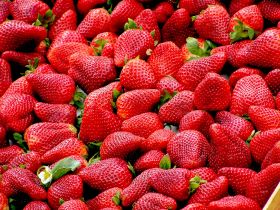
Strong growth as strawberry love affair continues
The undisputed berry king managed to pip bananas to fourth spot this year, reflecting their enduring popularity with the public. Their 6.1 per cent value increase is significant for a mature category, and is the highest out of the top eight products.
Jacqui Green, chief executive of Berry Gardens, says a cold winter this year has yielded a good quality crop with plenty of sunshine sweetening the fruit. “Availability has been good with quality consistent,” she says. “We have seen the younger generation demographic buying into berries, as well as our traditional heartland of children and over-45s.”
New varieties like Driscoll’s Lusa, and Ava berries from Scotland have extended the season without sacrificing quality, meaning momentum is kept throughout the year. “One of our Scottish growers delivered fruit in store for Christmas last year and we started picking again mid-February – so literally only a six-week window of no UK production,” says Green.
Jill Witheyman of Angus Soft Fruits says this also aids the recruitment process: “Consistent levels of production also helps manage our labour requirements through the season. This means our experienced picking teams have consistent reliable work right the way through the season which encourages them to come back every year.”
05. Bananas
Value: £581.6m (+3.9%) Volume: 696m kg (-1.1%)
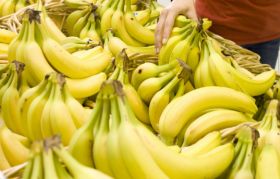
Stable year for bananas despite currency concern
In comparison to a number of other products it has been a relatively serene year for bananas, with the biggest challenge having been a period of poor weather in Latin America resulting in a number of vessel delays between January and April.
The category continues to see modest price inflation as the effects of a weak pound filter through to the retail shelf, according to SH Pratt commercial director Simon Trewin, though as bananas are sourced from outside Europe importers are hoping to be better insulated from the effects of Brexit than other sectors. Currency exchange is set to remain a key concern for the whole trade.
A long hot summer could suppress sales as consumers opt for seasonal berries and stonefruit, but overall the category is holding its own well against newer consumer favourites.
In a largely own-label category, Chiquita is one brand looking to cement its name in shoppers’ minds and its ‘We Are Bananas’ campaign is currently running across London, targeting the key group of mums and millennials.
The campaign combines the messages of fun and healthy eating, and given the prominence of unbranded product in supermarkets, could well give an incremental boost to the wider category as well as Chiquita itself.



